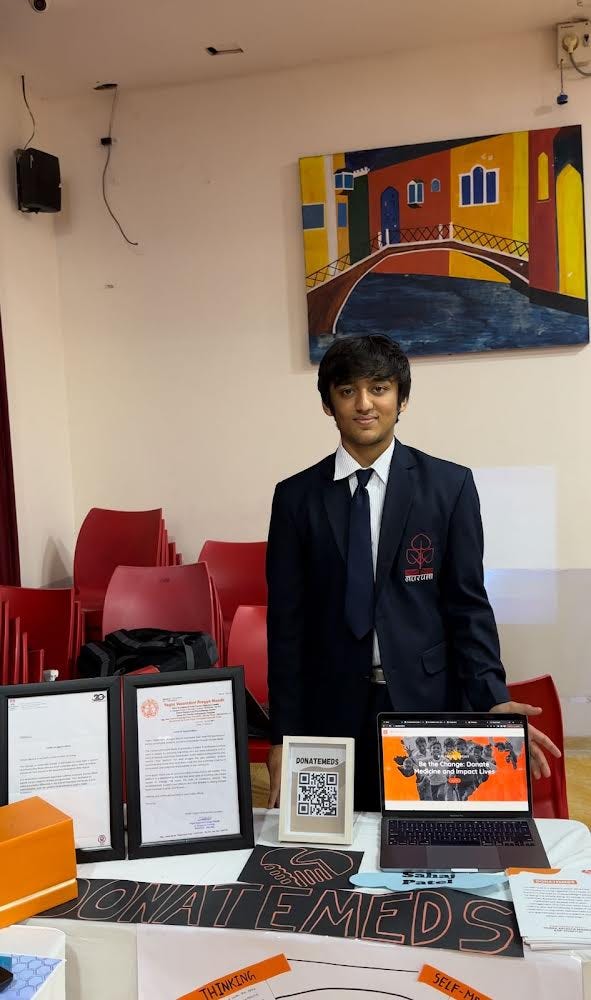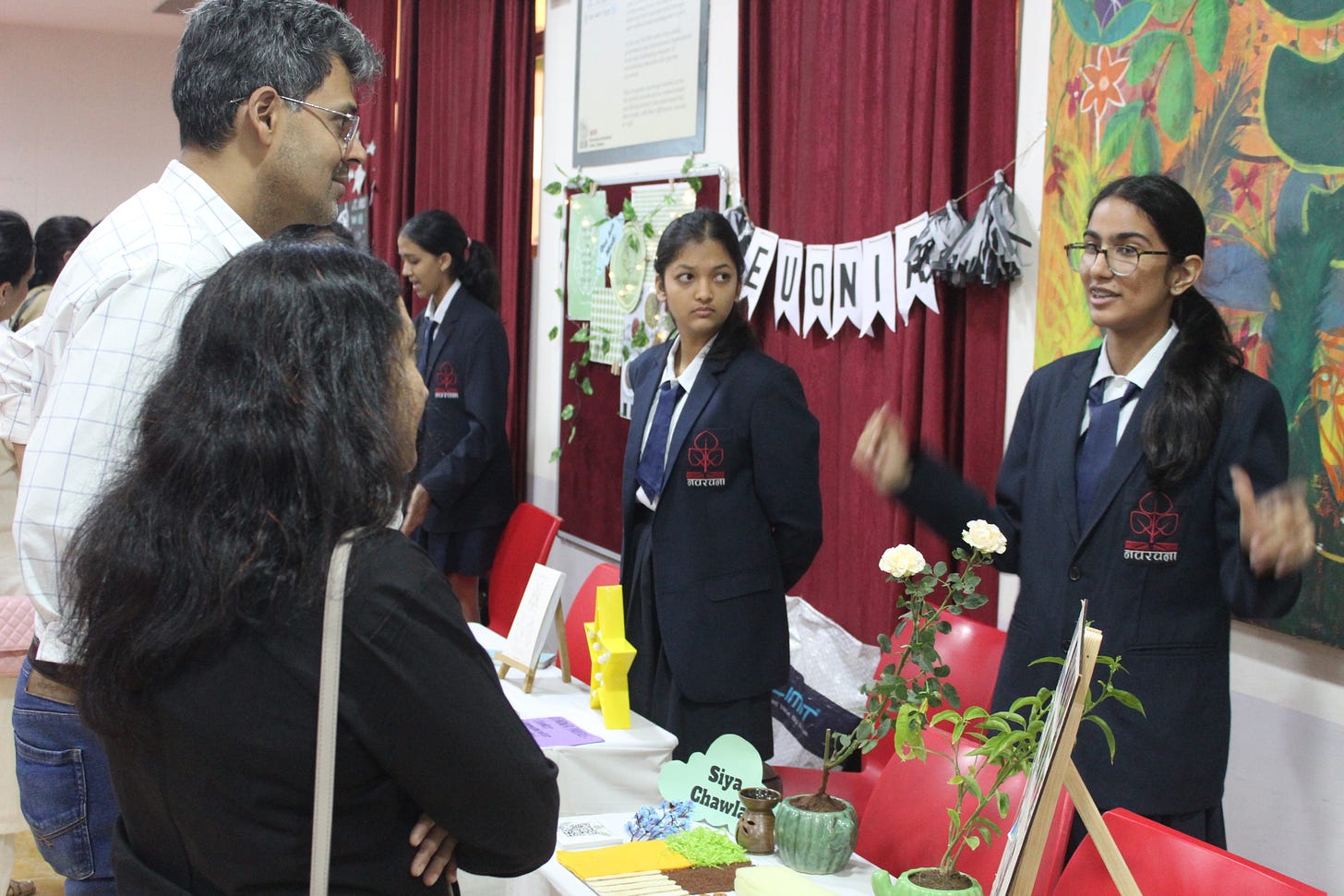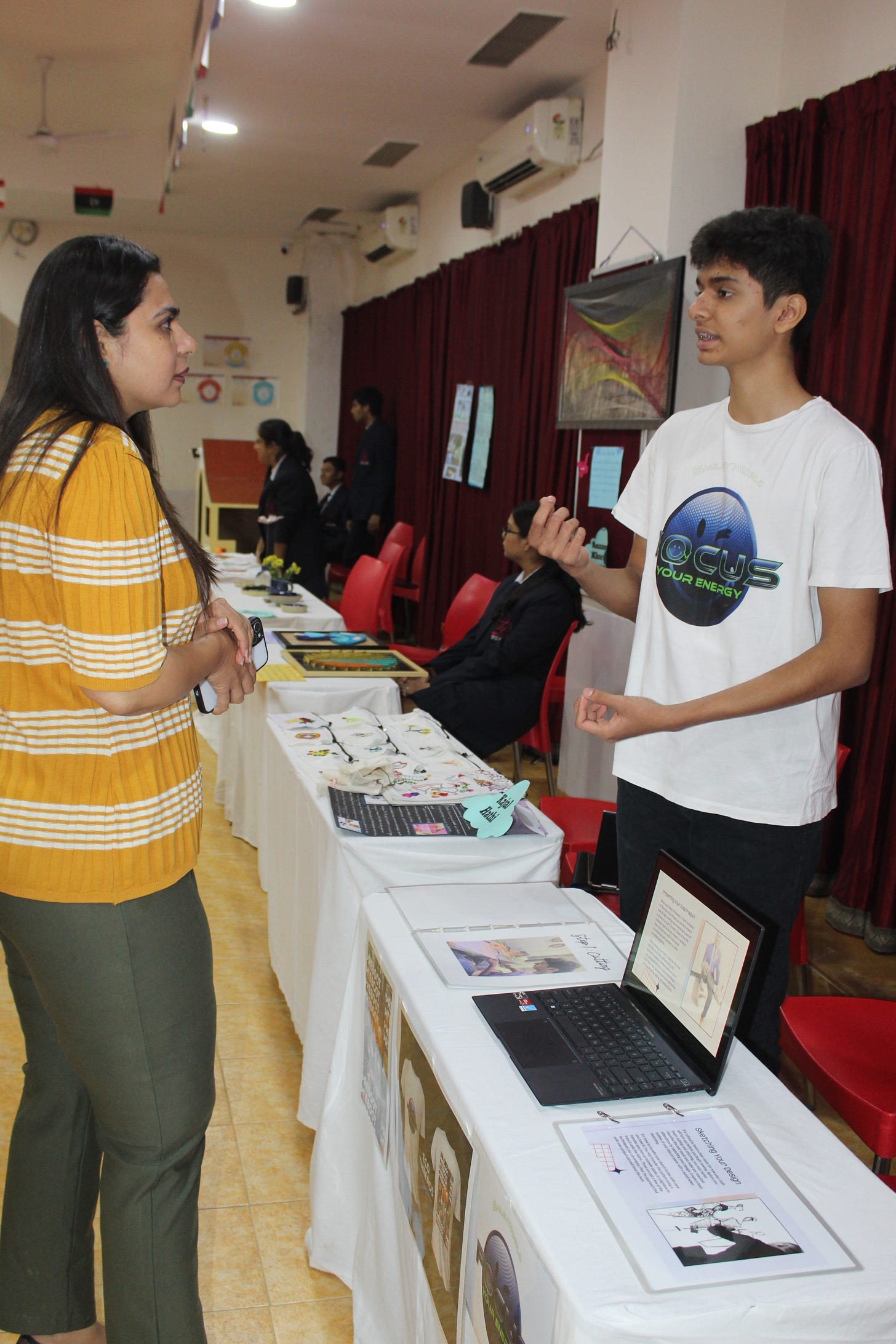I was most impressed recently when I checked out some of the Personal Projects made by grade X (IB) students of one of the schools I am associated with. The young teens, barely 16 years old, came up with amazing passion projects in which they had identified some of the key problems that concerned young people and offered solutions for the same that they thought fit. Sometimes the problems were more general in nature -- for example, the ones they observed in their home, or somewhere they were out with their friends. They thought about those too and came up with problem-solvers. It was the most heartening feeling and that’s why I specially scheduled this upload for the last one of year 2023 – young blossoms of hope and warmth and thinking positively about others -- in a dark world that continues to bomb and kill and maim, destroying homes and livelihoods.
Sahaj Patel, grade X, IB, NISV, with his Donate Meds project.
Take, for example, Donate Meds, a platform imagined and created by Sahaj Patel. Sahaj accessed research that revealed up to 70% of medicines are wasted due to some reason or the other – often this is due to patients deciding for themselves when to stop medication or doctors changing prescription as the patient has begun to show improvement or deterioration in physical condition. Very few chemist shops accept back such unused medicines once sold. But these ‘wasted’ medicines can improve/save the lives of many hundreds of people who cannot afford them at all. Sahaj therefore developed a working plan that helped bridge the gap between surplus medicines gathering dust in homes and the needy and under-privileged patients who desperately require them. And it’s quite simple, really. Donate Meds has a user-friendly webpage
(https://donatemeds.in/) with a form that those having excess medicines should fill up. The medicines will be picked up from your home as per the day and time of your convenience. The collected medicines are then delivered to the Yogini Arogya Mandir and the KGP Hospital (with whom Sahaj has tied up) to be distributed as required, free of cost, to the needy patients being treated there. Says Sahaj, it was an unreal feeling when I first saw the smiles on the faces of the patients to whom Donate Meds had helped. It made every minute of every task worth it. This personal project journey has not only developed my skills, but it has given me the joy of helping people, of being empathetic.
Os
Ose Ada Modi, grade X, IB, NISV with her Better Brain Box project.
As against a completely down-to-earth, practical project like Donate Meds was a complex project like Better Brain Box by Ose Ada Modi that explored the abstract theories of psychology and neuroscience to help in calming down a person in grip of negative emotions. Sounds wild? It is, to an extent. Researching the effects of certain foods on negative emotions, Ose created a combination of food items (largely nuts and seeds) that would reduce the extent to which that emotion is generally experienced by the sufferer on a regular basis. The learning goal was to understand the brain, hormones, emotions, and their connection with food. Since Ose could not find or access much research online, she kind of jumped the gun and roped in a bunch of school teachers to try her experiment on. She zeroed in on common undiagnosed mental health issues such as anxiety, depression, forgetfulness, anger control, hyperactivity and low self-esteem. She selected attractive tubular glass slims in which she packed each of the seeds/nuts (largely, flaxseeds, sesame seeds, pumpkin seeds, cubes of dried fruit like apricot, dark chocolate, cashew and almond bits, and so on) that had known positive effect, especially in smartly created combinations. The teacher-users were given 15 tubes of her simple ‘medication’, one consumed per day in its entirety in one go. At the end of 2 weeks the teacher-users gave her feedback, which was largely positive but with suggested modifications. It reinforced the faith I had in what I was doing, says Ose, who had never studied psychology (and certainly not neurosciences), but as a teenager she was very aware of mental health issues and wanted to do her bit in edging towards possible treatments that were simple and homely and non-threatening!
Siya Chawla, grade X, IB, NISV, explaining her Garden of Healing project to visitors at the Display.
Siya Chawla’s Garden of Healing sensory project explored the positive effect that aromatherapy had on children with Autism, helping them cope better and improving their performance in academics. She identified certain plants the scents of whose flowers, leaves and fruits can calm down those with autism. She used a discarded sandpit in the yard of the Disha Special School and Autism Centre turning it into a Garden of Healing where she planted and nurtured 25 plants with unique scents that work in harmony to help enhance the lives of children battling the demons of Autism. These include lavender for its sweet scent, honeysuckle for its floral scent, and lemon balm for its citrus scent. Siya’s research included identifying the scents autistic children found comforting and then used that data to find plants that emit those same scents, taking into consideration the climatic conditions. That is how she selected the 25 plants, thus completing the first part of the project. However, she soon realized that since the plants were in the garden, the children needed to be taken there for the aromatherapy to work. So she extracted oils from plants and managed to get each room in the Disha School a donation of a diffuser so that the benefits can be availed through the day. The Garden of Healing has triggered another idea in Siya. If aromatherapy can take care of the sensory needs of these children, perhaps the creation of a walking path with a plethora of textures on which the children can walk barefoot through the garden, feeling the various textures beneath their bare feet might fulfil their tactile needs as well! So now she is working on that too. This project has awakened the researcher in Siya big time – she has written a research paper about the effect of olfactory sensory stimulation on those on the autistic spectrum. Her research has confirmed the correlation between children having their sensory needs met and in increased academic performance. She plans to take this work forward. In the meanwhile, her passion has found an outlet in helping so many autistic children in my small town!
Samarth Tannk, grade X, IB, NISV, wearing his own handmade T-shirt with organic cotton!
For Samarth Tannk, this personal project journey was ‘a rollercoaster of highs, lows, and loops’. He was planning on investigating some aspect of cooking as the theme, then changed to fashion designing specializing in sportswear, and finally settled on exploring sustainable organic cotton fabric to create T-shirts! Typical of enthusiastic youngsters raring to go! Like most of his classmates, he had begun thinking about his project in April 2023 when he came into grade X. The fact that his dad was in the fashion industry helped. Samarth struggled through understanding the art of stitching clothes, navigating the 2-month long lengthy process of sourcing organic cotton from Bangladesh, and learning the importance of being organized in every task undertaken. While waiting for the fabric to arrive, he taught himself garment creation and learning to stitch. He decided to make a few for the Project display, taking a week to complete stitching one T-shirt! And so Nebula Knits was born. Samarth’s venture was much appreciated at the display. He says, people were intrigued by my venture into sustainable garment making, amazed that I'd stitched them myself! Their interest and positive reception buoyed my spirits, providing a rewarding conclusion to this phase. As I anticipate the road ahead, I'm excited for what the future holds and hopeful that it will be as fulfilling as this remarkable journey.
Naitik Jani, Jayvardhan Israni (both grade VII), Jainil Patel (grade VIII), Navrachana Vidyani Vidyalaya, with their Self-Lacing Shoes project at their stall at IIC Regional Meet 2023, Gujarat University. Their innovative product bagged the second prize!
While I was writing this, came the news that in another of our schools with a very active Atal Tinkering Lab (ATL) programme, three students, barely in their teens, Jainil Patel (grade VII), Jayvardhan Israni and Naitik Jani (grade VIII) worked on an outstanding project, Self-Lacing Shoes, that got them second position at the IIC Regional Meet 2023 at Gujarat University and were further honoured with the Best ATL Innovation Stall memento. The youngsters had worked on designing shoes which laced and unlaced themselves such that the elderly and others suffering from any debilitating diseases or disability that did not allow them to bend easily, could find them very useful. The trigger for this invention was when they saw a teacher with arthritis struggling to tie the laces of her shoes. The students conducted surveys within the school and the SSG Hospital where feedback from patients with back problems was overwhelmingly positive. The doctor they consulted at SSG Hospital offered valuable tips for further enhancing the effectiveness of the shoes.
From the same school, Laksha Patel, Mantavya Damor and Dhruv Chandarana (all from grade IX and active in the ATL) designed a Self-Stabilizing Spoon that could stay balanced in the hand of persons with hand tremors, neurological disorders or disabilities affecting motor skills. This Spoon is designed to counterbalance itself according to the tilt angles it receives because of the shaking of the person’s hand. There would thus be no spilling of the contents in the spoon’s head.
When I hear of these endeavours and achievements by our young generation, I am convinced we are leaving the world in much safer hands than we have bothered to bequeath to them. Even more importantly, these kids are thinking about others around them, especially the elderly, those with mental health issues, and the physically compromised …
Happy 2024!









Wonderful ingenious projects by young geniuses!